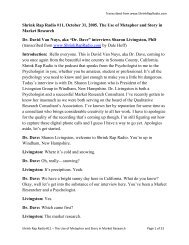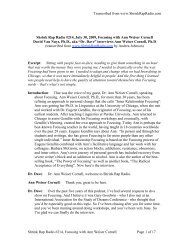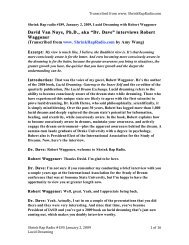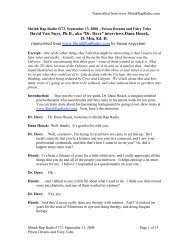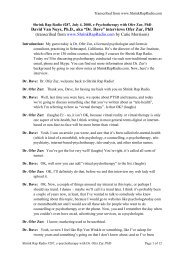interviews John Beebe, MD - Shrink Rap Radio
interviews John Beebe, MD - Shrink Rap Radio
interviews John Beebe, MD - Shrink Rap Radio
You also want an ePaper? Increase the reach of your titles
YUMPU automatically turns print PDFs into web optimized ePapers that Google loves.
Transcribed from www.<strong>Shrink</strong><strong>Rap</strong><strong>Radio</strong>.com<br />
played, back in the 50s, the big blockbuster movies of the time, like The High and<br />
the Mighty, with <strong>John</strong> Wayne; An American in Paris, and all that stuff, whereas the<br />
Rialto would play the foreign films, like Alec Guinness in The Lavender Hill Mob<br />
and French movies…like I still remember Les Jeux Sont Faits with Micheline<br />
Presle. And the movies changed at different rates, so I can remember one night, my<br />
mother and I going to the Playhouse at 7:30 and then running across Princeton to<br />
catch the show at the Rialto at 9:30. And that’s pretty remarkable when you’re 11<br />
years old, you know? To have that kind of cultural (laughs) emphasis.<br />
Dr. Dave: Yeah, you…<br />
<strong>Beebe</strong>: So I kept up the habit.<br />
Dr. Dave: Well, you know, you’ve just sent me on a personal journey as you were<br />
speaking. I realized, I mean I know that I’ve been kind of addicted to film, but I<br />
hadn’t really made the connection. But actually, I think I had a similar mother, in a<br />
certain way. She took me to the art film house early on. And I think at that time,<br />
often I didn’t understand the films or I found them a little bit boring, even, some of<br />
the time…or a little unsettling. But somehow it did get me into that mode of being<br />
okay with subtitles and with foreign films, so that later in college, somehow, I felt<br />
like I had discovered it (laughs) myself! And interestingly, we have an art film<br />
theater here in Santa Rosa, and it’s called the Rialto.<br />
<strong>Beebe</strong>: Oh, my goodness. Oh, my goodness. On the other side of the country? Well,<br />
film-going is a real habit, so I got the canon (?) – a great deal of what we call<br />
nowadays the canon – into me at a very, very early age, so that when really<br />
interesting film criticism started coming out, I was a medical student. And in those<br />
days, I was at the University of Chicago. Medical school can be an all-consuming<br />
thing, but fortunately that medical school was right on campus, and I could take a<br />
break at lunch and go to the university bookstore. And there would be all these<br />
wonderful magazines, and one day, I picked up a magazine called Film Culture.<br />
And there was a complete, long essay, which has since become one of the most<br />
famous books in film criticism, Andrew Sarris' The American Cinema. But in those<br />
days, it was called something like Notes on the Auteur Theory, The American<br />
Cinema. And so this was the beginning of talking about film as the expression of<br />
the director’s personal odyssey. And there were all these films I’d seen with my<br />
mother being discussed and listed and ranked, and discussed in terms of the<br />
expression and of different directors’ points of view and style. And I just drank it<br />
in. When I got into Jungian analysis just a few years later, after a few years of… It<br />
really became very obvious that the filmmakers that were called the auteur<br />
filmmakers were using the medium of film in exactly the same way I was using my<br />
analysis: to understand and extend their own personalities and make them evident<br />
to themselves. And so when I got around to wanting to teach what Jungian analysis<br />
is, it seemed, well, I can’t take people into my own analysis. Even if I wanted to<br />
tell everything that happened, it wouldn’t be the same as actually experiencing it.<br />
But I could give them the simulated experience by showing them a movie, and then<br />
<strong>Shrink</strong> <strong>Rap</strong> <strong>Radio</strong> #166, August 1, 2008 Page 8 of 18<br />
A Jungian View of the Feminine in Film




